The Independent's journalism is supported by our readers. When you purchase through links on our site, we may earn commission.
What I learnt from doing the London Triathlon with two weeks’ training
Swimming in that opaque, glowing green water, I think I caught something, says Andrew Griffin

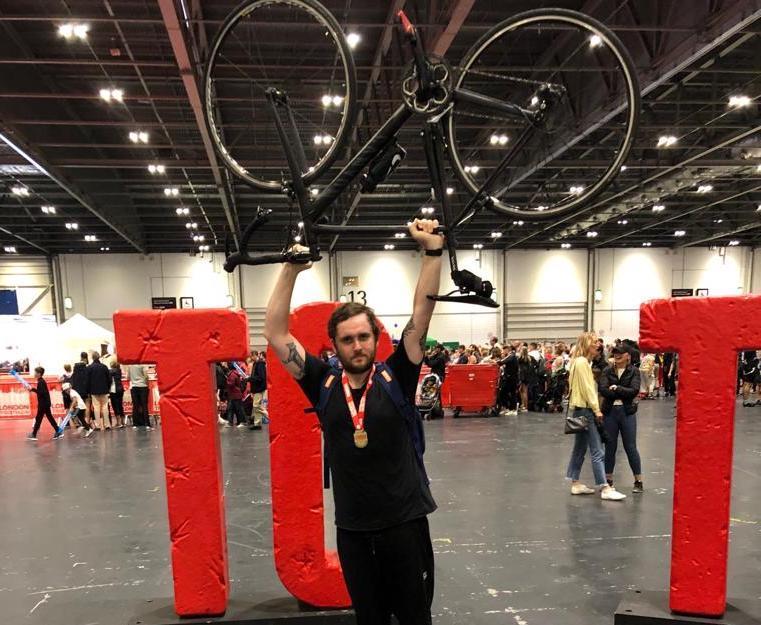
Your support helps us to tell the story
From reproductive rights to climate change to Big Tech, The Independent is on the ground when the story is developing. Whether it's investigating the financials of Elon Musk's pro-Trump PAC or producing our latest documentary, 'The A Word', which shines a light on the American women fighting for reproductive rights, we know how important it is to parse out the facts from the messaging.
At such a critical moment in US history, we need reporters on the ground. Your donation allows us to keep sending journalists to speak to both sides of the story.
The Independent is trusted by Americans across the entire political spectrum. And unlike many other quality news outlets, we choose not to lock Americans out of our reporting and analysis with paywalls. We believe quality journalism should be available to everyone, paid for by those who can afford it.
Your support makes all the difference.I am stood on a pontoon, wrapped in neoprene and looking like an alien, wondering whether I should question my life choices. This is the beginning of the London Triathlon: my first – and one that I only decided to enter two weeks ago – and for which I have done almost no training.
Just over an hour and a half later, I am sweaty and gleeful and stood in the ExCeL exhibition centre in London’s Docklands. I am a triathlete, I am wearing my first medal, I am being congratulated – and I am utterly hooked.
The journey between that chilly start line and the thrilling finish was among the most testing and rewarding of my life. But it was the journey that got me to that start line that was the real challenge.
The adventure started with an innocent email dropping into my inbox one Tuesday afternoon, inviting me to try the London Triathlon – the UK’s biggest – which snakes around the Docklands. I had always half-dreamed of doing a triathlon, but had scheduled it in my head for “next time” and “next year”, and nothing immediate. But then, something took hold of me, and I signed up.
A triathlon is a swimming race, then a cycling race, then a running one; in the case of the “sprint” version that I did, that meant 750 metres of swimming, then 20km of cycling, followed by 5km of running. I had just two weeks to prepare.
I am not a triathlete. Far from it. By chance, I have some experience in each of the three sports, though not much. I’m a swimmer who almost always swims breaststroke; a cyclist who largely rides an e-bike; I’m a runner who mostly walks.
After signing up, I’m in a panic and fling out questions at anyone I think might have done a triathlon. Some are encouraging. The Independent’s science correspondent tells me that all of your training needs to be finished two weeks before the race, and that nothing later than that makes any difference. This information comes under a fortnight before the race.
All of the training plans (and there are plenty of very useful ones all around the internet) recommend that you take eight weeks to get ready, presuming you are of decent all-round fitness already. There is no training plan to help you prepare for a triathlon when you have fewer than two weeks to train. If there were, it would presumably be very short, perhaps offering just one piece of advice: don’t do it.
In the face of this, I improvise and boil down what seems to be the fundamentals of triathlon training into something I can do in such a short time. In practice, this is a few principles: get as fit as you can, ensure that you’re practising each sport and not neglecting any, and try out the disciplines as close as possible to the way you will actually do them in the race.
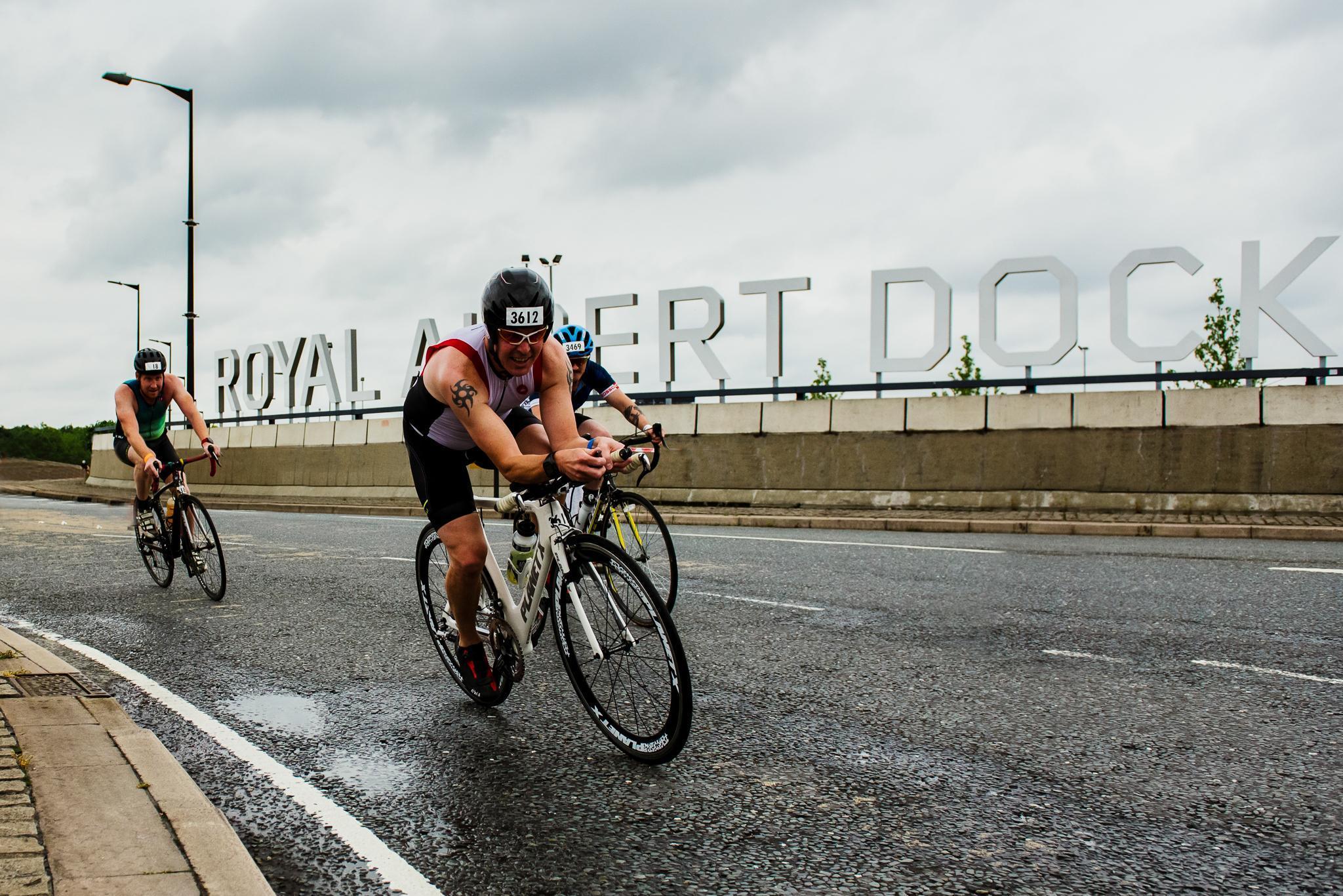
Which brings me to the phrase littered across these training plans, spoken about with the combination of doom and levity most familiar from the Old Testament. One word powerful enough to inspire fear in every triathlete, but familiar and important enough that it is constantly on their mind: bricks.
Bricks refers to the practice of transitioning between each discipline in the race: from swimming to cycling, from cycling to running. You’ve got to try and do all this as quickly as possible, of course, and the transition has been described as the fourth discipline in the triathlon. Valuable minutes can be lost or made up here, as you rush to change your clothes and get your kit for the next part of the journey. While nothing could have prepared me for the intense strangeness of these transitions in the actual race, they’re intended to at least run you through something like it.
Doing that is incredibly hard – far harder than it sounds. The difficulty of the change can’t be described as tiredness or pain, those familiar and sometimes pleasant results of exercise. Instead, it is closer to forgetting; your legs do really feel like bricks, unresponsive to you willing them to switch from cycling into running, simply not moving in the way you’d expect or want them to. It doesn’t get easier with practice, but you get better at it – or at least become more familiar with it.
As you look through the library of training plans that are everywhere on the internet, everything you read stresses the importance of the taper: the point before the race at which you cut down the intensity of your workouts and give your body the opportunity to get ready for the big moment. But all of the guides stress that this should happen at least a few days before the race. The problem is, I don’t have a few days. So, I instead just do nothing for the couple of days before the race.
There is no training plan to help you prepare for a triathlon when you have fewer than two weeks to train
Triathlons are expensive. If you’re starting totally from scratch, you will need to buy a bike, get yourself some decent running shoes and invest in a wetsuit and a trisuit. The wetsuit’s job is obvious, but the trisuit serves as a base layer that you can wear underneath for the swim and then which will suit for both cycling and running. I used Zone 3’s kit for both, and while there was no outfit in the world that could have made me look or feel good while doing a triathlon, they did their absolute best and fulfilled their role perfectly. It fitted like a second skin, and more specifically the skin of a lithe fish.
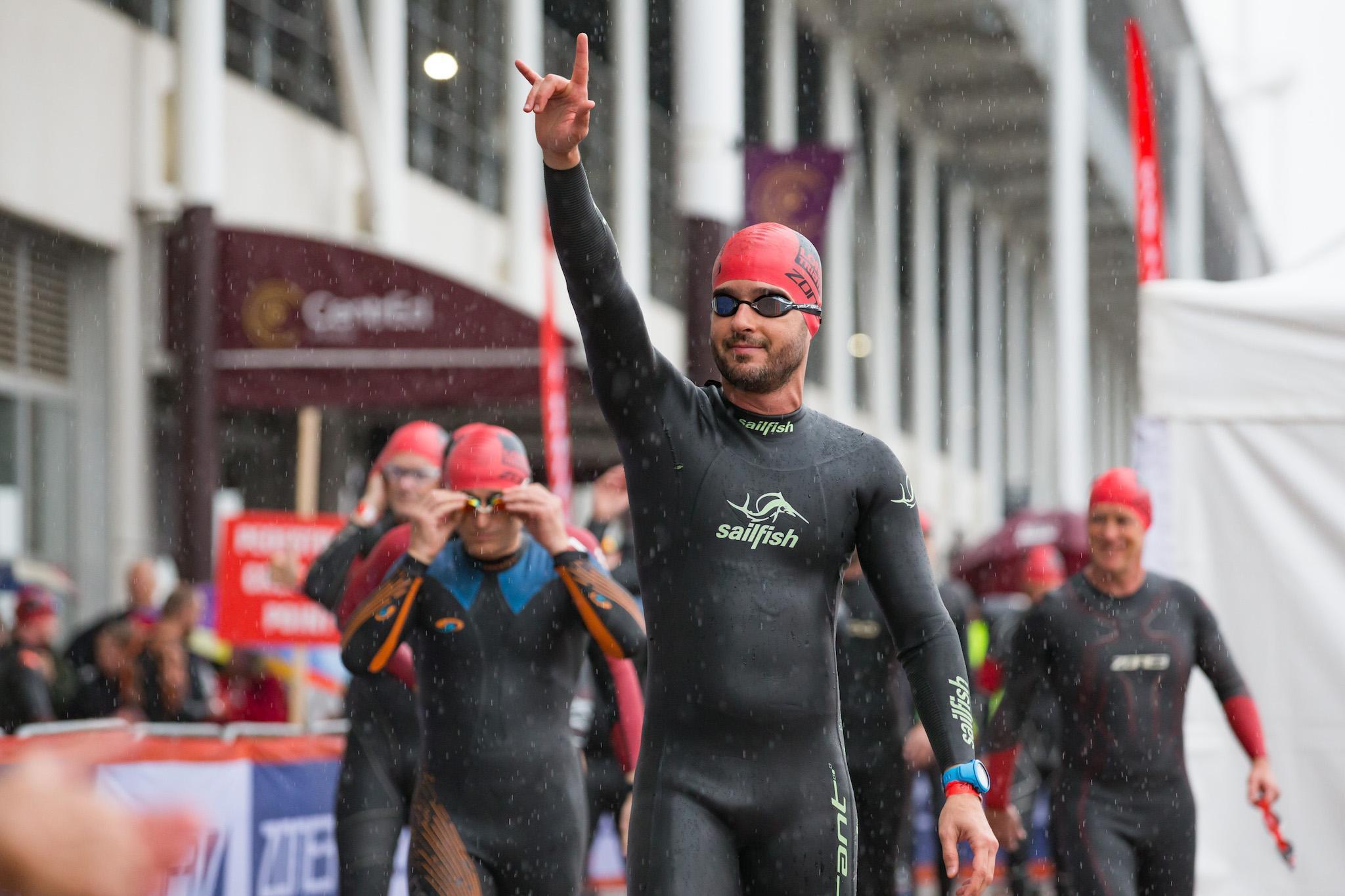
Kit assembled and unusual clothes on, the triathlon properly begins when you (looking utterly ridiculous in your wetsuit, goggles and swimming cap combo) are funnelled through the queues in your wave, and into the “swim briefing”, where someone briefs you through the various things to do to ensure everything goes well.
At this point, my nerves are ablaze, and to calm them down I’m trying to remember that I have done these distances before. But I find myself only really able to think about how little I’ve done those distances, and visualising the many ways in which this could go horribly wrong. I had thought that there might be a sense of solidarity between us all – dozens of alien-looking fools who had voluntarily put ourselves forward for this – but, as I look around at people’s goggled faces, they glare back. One thing’s clear: we are competitors. After being asked to bear hug the person next to you and geed up with some call and response, you’re off out into the cold air of the Royal Docks.
Climbing down off a pontoon and into the water, you bob around waiting for the beginning of your wave. It’s announced via the booming of a horn and then all hell breaks loose. It’s less swim, more scramble; limbs and bright green water are everywhere, and all form and rationality goes very quickly out of the window.
It’s at this moment, in a wave of dread and anger, that the full stupidity of what I have done overtakes me. Halfway around the swimming route, struggling to see and being kicked in the face, I start kicking myself, too: this was idiotic, arrogant, unnecessary. This is exactly the worst place to start getting stressed out like this, with my breathing getting faster and faster and nothing to lean on to take a break. It’s compounded by the fact that this was supposed to be my best discipline: if I’m doing this badly on one I’m good at, what hell awaits in the run? There’s no option but to push through, and nowhere else to go but forwards – so I just keep going.
Getting out of the water means clambering up a pontoon and then taking off your wetsuit. You throw that in a bag and run to your bike, where you get ready to set off on the second part of the mission. All that transition practice is supposed to kick in here – but it’s difficult still, and I dread to think how stressful and painful it would have been without preparation.
The swim went much more quickly than I had expected (I have a Garmin bike computer and an Apple Watch, both of which do a great job at tracking my progress, but neither is much use during the swim). All of that stress was unnecessary, it turns out. That realisation gives me a jolt of excitement, and I speed out of the transition zone and out on the bike.
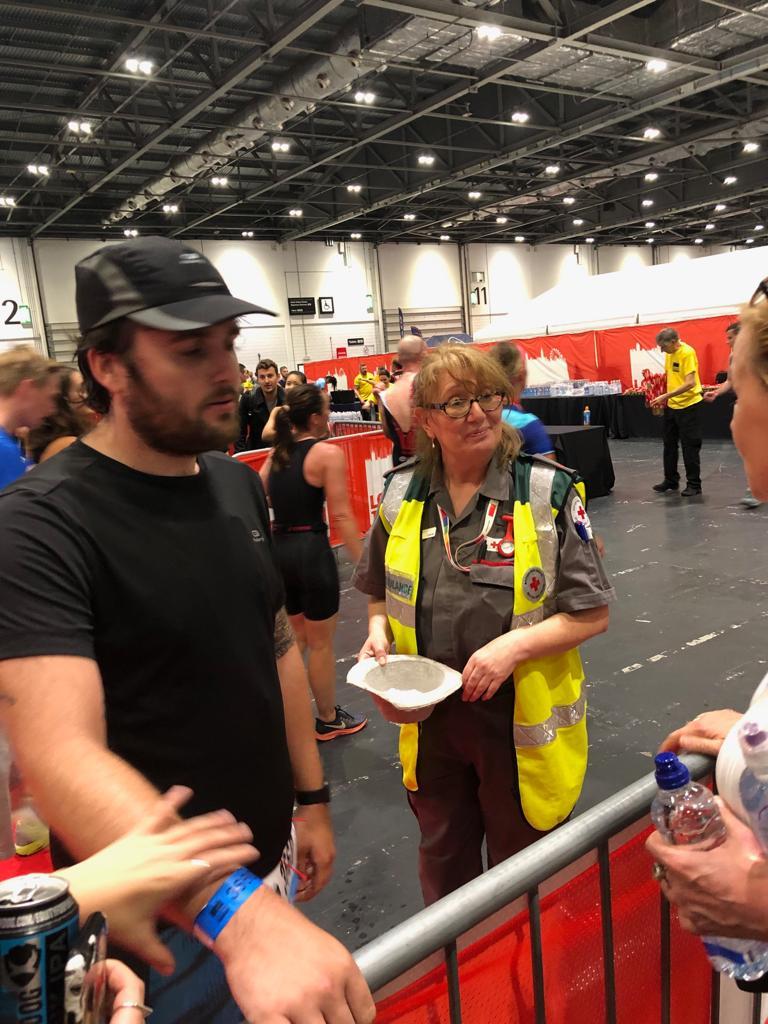
The bike race flies by. It’s not an especially picturesque journey: the long route heads past all of the iconic London landmarks, but I’m doing the short one, and so just fly by the Docklands.
The run is a slog. Switching from cycling to running is even more tiring than it sounds, and than it ever was when I practised. But at this point I am electric with the thrill of having done it. I no longer care what my time is, how tired I am or that I spend half the time half-walking as I struggle to do that final 5k run.
As I look around at people’s goggled faces, they glare back. One thing’s clear: we are competitors
I had thought that in these final, toughest moments of the race I might learn something profound about myself, discover new ground through pushing the boundaries of my endurance. In practice I’m far too tired for that, and have no spare energy to divert to it. But with the fatigue comes a sense of relief: I have nothing to do but keep pushing myself, no space for anything else in my head. It’s something like the experience I’ve had throughout these past two weeks: it has pushed away anxiety and melancholy and replaced it with a kind of furious focus.
As I arrive at the finish line – past the announcer who shouts out your name as you finish and into the arms and cameras of those supporters who have done their own endurance challenge in waiting for me – I am shattered. But I’m also buzzing with the excitement of being here at all.
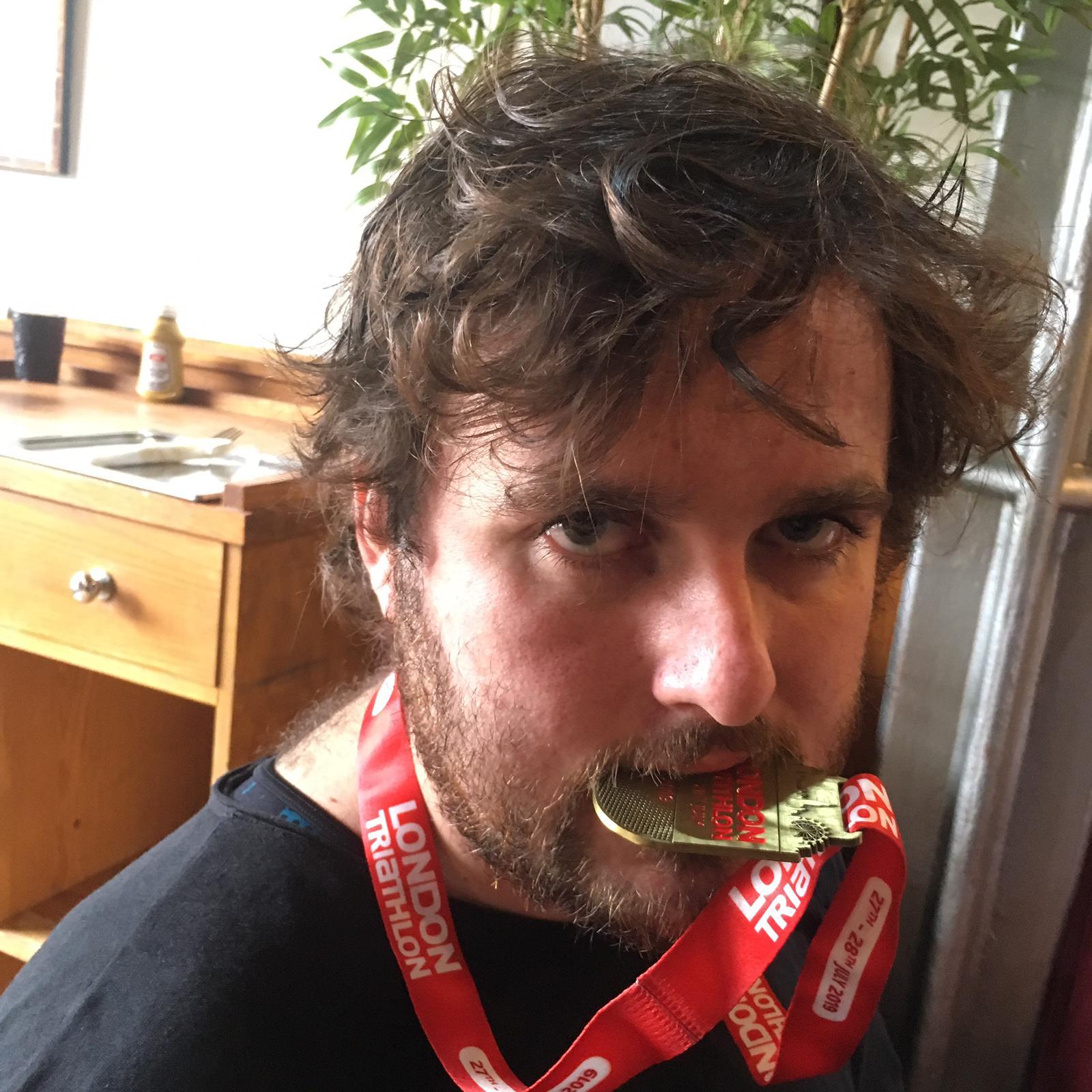
Before the race, I’d told people that I’d be happy just to finish; to some I’d confided that I was aiming for under two hours. In the end I not only finished but did so much faster than I’d thought, with everything over in an hour and 38 minutes. That puts me almost exactly in the middle of the almost 1,200 people who did the same event. I’ve never been happier to be average.
Walking through the end you’re handed a medal and a finishers’ T-shirt, and later on I’m handed a pint. (I haven’t drunk for the two weeks I’ve been training, which in itself was a rewarding challenge). Thousands of people stream past me and those people who once felt like my opposition now feel like friends, each of us foolish enough to try this entirely unnecessary but wholly wonderful exercise.
Less than a day later and I’m frantically researching my next race, my next foolish challenge. I’m thinking about entering for the London Triathlon next year – except at the Olympic distance this time, which is twice as long, and perhaps with a little more preparation. They warned us about not swallowing the water out in that swim, that we could catch something. It turns out I did: I’ve got the bug.
Join our commenting forum
Join thought-provoking conversations, follow other Independent readers and see their replies
Comments